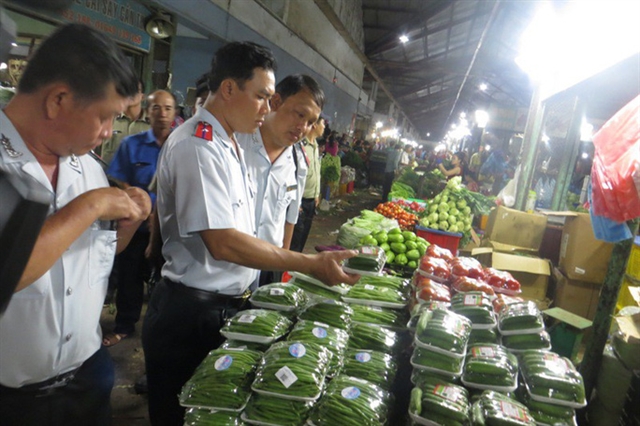 Society
Society


|
| Inspectors from the HCM City Food Safety Management Board inspect the Thủ Đức agriculture wholesale market in HCM City for food safety before Tết (the Lunar New Year). — Photo nld.com.vn |
HCM CITY — The HCM City Food Safety Management Board inspected the Thủ Đức agriculture wholesale market in HCM City for food safety early Saturday morning.
The inspection, part of efforts to ensure food safety during Tết (the Lunar New Year), was led by head of the board, Phạm Khánh Phong Lan, and officials took random samples of fresh vegetables and fruits sold at the market for testing.
As the city’s largest agricultural market with a throughput of 4,000 tonnes per day, Thủ Đức faces a high risk of getting low-quality products with untraceable origins.
Lan said: “Vegetables and fruits are highly impacted by the overuse of chemical fertilisers and pesticides. The board has to step up sampling and testing activities to evaluate the potential health risk associated with the contamination.
“Each trader is asked to keep records on product origins.
“If a violation is found based on laboratory test results, the records will be used to remove products known to be contaminated or adulterated from the market and appropriate action will be taken.”
The high cost of laboratory testing of VNĐ 3 million (US$129) per sample makes it difficult for the board to carry out regular surveillance, she explained.
She said the market management should adopt testing models used at supermarkets which take samples and evaluate potential risks every night.
Nguyễn Nhu, deputy director of the Thủ Đức Agriculture Wholesale Market Joint Stock Company, said a food safety management team performed sampling and testing activities every night for agriculture products with high potential health risks though not for all products sold in the market.
The team regularly warns traders at the market to comply with food safety regulations, he said.
However, their low awareness reduces compliance with food safety practices such as maintaining notes on product origins and non-use of chemicals for whitening products or keeping them fresh.
The market has a total of 1,424 booths, including 590 that trade vegetables and 712 that trade fruits. — VNS




